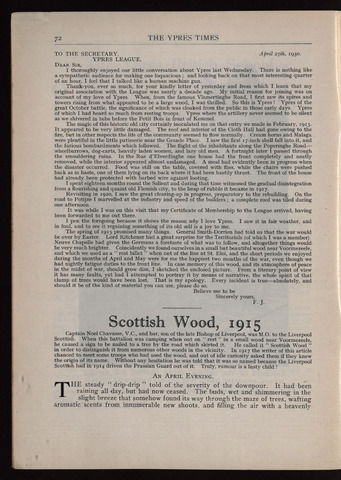Scottish Wood? 1915
72
THE YPRES TIMES
TO THE SECRETARY, April 27th, 193°-
YPRES LEAGUE.
Dear Sir,
I thoroughly enjoyed our little conversation about Ypres last Wednesday. There is nothing like
a sympathetic audience for making one loquacious and looking back on that most interesting quarter
of an hour, I feel that I talked like a human machine gun.
Thank-you, ever so much, for your kindly letter of yesterday and from which I learn that my
original association with the League was nearly a decade ago. My initial reason for joining was on
account of my love of Ypres. When, from the famous Vlamertinghe Road, I first saw its spires and
towers rising from what appeared to be a large wood, I was thrilled. So this is Ypres Ypres of the
great October battle, the significance of which was cloaked from the public in those early days. Ypres
of which I had heard so much from resting troops. Ypres where the artillery never seemed to be silent
as we shivered in tubs before the Petit Bois in front of Kemmel.
The magic of this historic old city certainly inoculated me on that entry we made in February, 1915.
It appeared to be very little damaged. The roof and interior of the Cloth Hall had gone owing to the
fire, but in other respects the life of the community seemed to flow normally. Cream horns and Malaga
were plentiful in the little patisserie near the Grande Place. I saw the first 17-inch shell fall into it, and
the furious bombardments which followed. The flight of the inhabitants along the Poperinghe Road
wheelbarrows, dog-carts, heavily laden women, and lazy old men. A fortnight later I passed through
the smouldering ruins. In the Rue d'Elverdinghe one house had the front completely and neatly
removed, while the interior appeared almost undamaged. A meal had evidently been in progress when
the disaster occurred. Food was still on the table, covered with flies, while the chairs were pushed
back as in haste, one of them lying on its back where it had been hastily thrust. The front of the house
had already been protected with barbed wire against looting.
I spent eighteen months round the Salient and during that time witnessed the gradual disintegration
from a flourishing and quaint old Flemish city, to the heap of rubble it became in 1917.
Revisiting in 1920, I saw the great clearing-up in progress, preparatory to the rebuilding. On the
road to Potijze I marvelled at the industry and speed of the builders a complete roof was tiled during
one afternoon.
It was while I was on this visit that my Certificate of Membership to the League arrived, having
been forwarded to me out there.
I pen the foregoing because it shows the reason why I love Ypres. I saw it in fair weather, and
in foul, and to see it regaining something of its old self is a joy to me.
The spring of 1915 promised many things. General Smith-Dorrien had told us that the war would
be over by Easter. Lord Kitchener had a great surprise for the Territorials (of which I was a member).
Neuve Chapelle had given the Germans a foretaste of what was to follow, and altogether things would
be very much brighter. Coincidently we found ourselves in a small but beautiful wood near Voormezeele,
and which we used as a rest billet when out of the line at St. Eloi, and the short periods we enjoyed
during the months of April and May were for me the happiest two months of the war, even though we
had nightly fatigue duties to the front line. In case memory of this wood, and its atmosphere of peace
in the midst of war, should grow dim, I sketched the enclosed picture. From a literary point of view
it has many faults, yet had I attempted to portray it by means of narrative, the whole spirit of that
clump of trees would have been lost. That is my apology. Every incident is trueabsolutely, and
should it be of the kind of material you can use, please do so.
Believe me to be
Sincerely yours,
F- J-
Captain Noel Chavasse, V.C., and bar, son of the late Bishop of Liverpool, was M.O. to the Liverpool
Scottish. When this battalion was camping when out on rest in a small wood near Voormezeele,
he caused a sign to be nailed to a tree by the road which skirted it. He called it Scottish Wood
in order to distinguish it from numerous other woods in the vicinity. In 1917 the writer of this article
chanced to meet some troops who had used the wood, and out of idle curiosity asked them if they knew
the origin of its name. Without any hesitation he was told that it was so named because the Liverpool
Scottish had in 1914 driven the Prussian Guard out of it. Truly, rumour is a lusty child
An April Evening.
THE steady "drip-drip told of the severity of the downpour. It had been
raining' all day, but had now ceased. The buds, wet and shimmering in the
slight breeze that somehow found its way through the maze of trees, wafting
aromatic scents from innumerable new shoots, and filling the air with a heavenly

